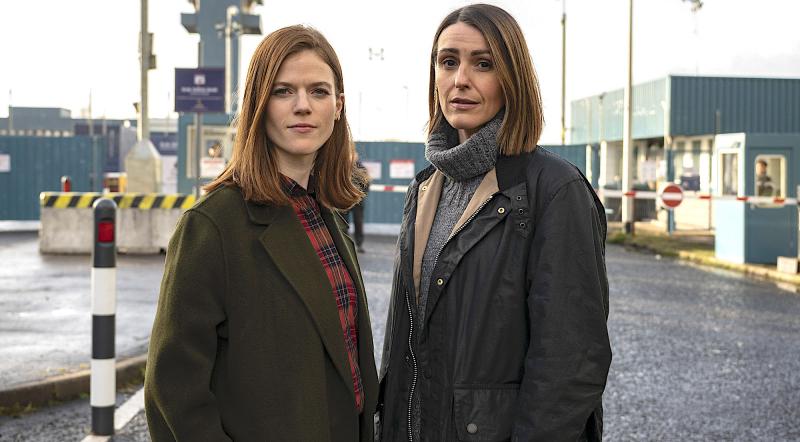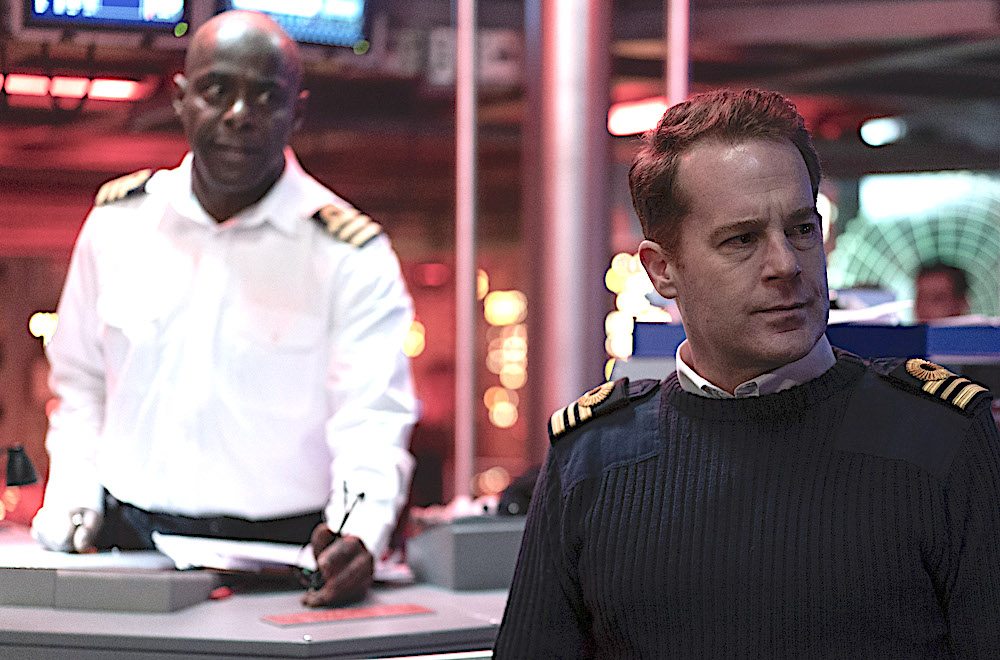Vigil, BBC One review - murder most watery | reviews, news & interviews
Vigil, BBC One review - murder most watery
Vigil, BBC One review - murder most watery
What does the Navy have to hide at its Trident submarine base?

Submarines have delivered some memorable on-screen performances, from Run Silent, Run Deep to The Hunt for Red October. On the other hand, we must not overlook the treasurably idiotic BBC series The Deep, which featured a submarine with a “moon pool” in it (this was a big vent permanently open to the ocean).
Vigil isn’t quite as absurd as that, and in fact takes itself extremely seriously, even though the underwater shots look distinctly creaky. It's made by World Productions, home of Line of Duty and Bodyguard, and written by Tom Edge, who also authored the Judy Garland film Judy as well as telly-isations of J K Rowling’s Strike novels. It centres around HMS Vigil, one of the Royal Navy’s Trident-armed nuclear submarines, which automatically introduces a degree of moral ambiguity into the mix. Judging from remarks made by various characters, it seems Vigil is a problematic vessel (Stephen Dillane’s Admiral Shaw announces angrily that there will be serious changes on board when it gets back to port), and it sailed headlong into a sea of troubles in this opening episode.
 It looked at first as if Vigil was responsible for snagging the nets of a Scottish trawler and dragging it fatally under water, but the situation proved to be more complex. Vigil didn’t do it, but another submarine did. Probably a Russian one. What was alarming to Captain Newsome (Paterson Joseph, pictured above with Adam James) was that Vigil’s surveillance systems hadn’t spotted it. Since Vigil is supposed to be Britain’s invisible nuclear deterrent, if an undetectable enemy can shadow it, that deterrent is lost. Though if this sub was clever enough to avoid detection by Vigil, you'd think it might be able to avoid a mere trawler.
It looked at first as if Vigil was responsible for snagging the nets of a Scottish trawler and dragging it fatally under water, but the situation proved to be more complex. Vigil didn’t do it, but another submarine did. Probably a Russian one. What was alarming to Captain Newsome (Paterson Joseph, pictured above with Adam James) was that Vigil’s surveillance systems hadn’t spotted it. Since Vigil is supposed to be Britain’s invisible nuclear deterrent, if an undetectable enemy can shadow it, that deterrent is lost. Though if this sub was clever enough to avoid detection by Vigil, you'd think it might be able to avoid a mere trawler.
All that was pushed to one side by the sudden death of crewman Craig Burke (Martin Compston, abandoning DI Steve Arnott’s south London accent in favour of his native Scottish tones), seemingly from a heroin overdose. His death occurred while Vigil was in British territorial waters, which apparently meant that Police Scotland had to be called in (though only after a battle of wills with the MoD). However, since Vigil was on active duty the Navy refused to recall it to base, and instead agreed to have a detective helicoptered out to meet the boat somewhere in the Atlantic.
Step up, DCI Amy Silva (Suranne Jones), who was soon aboard a rescue chopper clattering out from Dunloch naval base over the ocean. Frankly she seemed a bizarre choice for the task of spending three days aboard a submarine. She’s afraid of heights, as illustrated by her terror at being winched down to the boat, she has a phobia of enclosed spaces, and she’s on medication for anxiety and depression, following a horrific experience of bereavement and near-death by drowning. She should be on indefinite furlough, rather than a solitary female detective being dropped into a secretive, almost-all-male military environment like this.
 Anyhow, wouldn’t you know it, but Amy’s investigations soon began to indicate that Burke had been murdered. Her couple of years of an unfinished medical training easily enabled her to outsmart the ship’s doctor, while the evasiveness and hostility of Vigil’s crew spelt GUILTY! in flashing neon letters. Especially the aggressive and supercilious Executive Officer Prentice, played by Adam James at his most obnoxious.
Anyhow, wouldn’t you know it, but Amy’s investigations soon began to indicate that Burke had been murdered. Her couple of years of an unfinished medical training easily enabled her to outsmart the ship’s doctor, while the evasiveness and hostility of Vigil’s crew spelt GUILTY! in flashing neon letters. Especially the aggressive and supercilious Executive Officer Prentice, played by Adam James at his most obnoxious.
Back on shore, Amy was getting some help from her colleague DI Kirsten Longacre (Rose Leslie), who tracked down a link between the deceased Burke and anti-nuke protester Jade (Lauren Lyle), one of the wackily-dressed occupants of the Dunloch Peace Camp. The discovery of a video recording made by Burke (pictured above) hints at a dark conspiracy by the Navy, reeking of “corruption and fear”. And a sudden fault with Vigil’s nuclear reactor may point to a health-and-safety catastrophe in the making.
According to the end credits, Vigil has been made with support from the Scottish government, which makes no secret of its opposition to nuclear weapons. That may hint at an extra political edge, but doesn't make this a compelling drama.
Add comment
The future of Arts Journalism
You can stop theartsdesk.com closing!
We urgently need financing to survive. Our fundraising drive has thus far raised £49,000 but we need to reach £100,000 or we will be forced to close. Please contribute here: https://gofund.me/c3f6033d
And if you can forward this information to anyone who might assist, we’d be grateful.

Subscribe to theartsdesk.com
Thank you for continuing to read our work on theartsdesk.com. For unlimited access to every article in its entirety, including our archive of more than 15,000 pieces, we're asking for £5 per month or £40 per year. We feel it's a very good deal, and hope you do too.
To take a subscription now simply click here.
And if you're looking for that extra gift for a friend or family member, why not treat them to a theartsdesk.com gift subscription?
more TV
 Murder Before Evensong, Acorn TV review - death comes to the picturesque village of Champton
The Rev Richard Coles's sleuthing cleric hits the screen
Murder Before Evensong, Acorn TV review - death comes to the picturesque village of Champton
The Rev Richard Coles's sleuthing cleric hits the screen
 Black Rabbit, Netflix review - grime and punishment in New York City
Jude Law and Jason Bateman tread the thin line between love and hate
Black Rabbit, Netflix review - grime and punishment in New York City
Jude Law and Jason Bateman tread the thin line between love and hate
 The Hack, ITV review - plodding anatomy of twin UK scandals
Jack Thorne's skill can't disguise the bagginess of his double-headed material
The Hack, ITV review - plodding anatomy of twin UK scandals
Jack Thorne's skill can't disguise the bagginess of his double-headed material
 Slow Horses, Series 5, Apple TV+ review - terror, trauma and impeccable comic timing
Jackson Lamb's band of MI5 misfits continues to fascinate and amuse
Slow Horses, Series 5, Apple TV+ review - terror, trauma and impeccable comic timing
Jackson Lamb's band of MI5 misfits continues to fascinate and amuse
 Coldwater, ITV1 review - horror and black comedy in the Highlands
Superb cast lights up David Ireland's cunning thriller
Coldwater, ITV1 review - horror and black comedy in the Highlands
Superb cast lights up David Ireland's cunning thriller
 Blu-ray: The Sweeney - Series One
Influential and entertaining 1970s police drama, handsomely restored
Blu-ray: The Sweeney - Series One
Influential and entertaining 1970s police drama, handsomely restored
 I Fought the Law, ITVX review - how an 800-year-old law was challenged and changed
Sheridan Smith's raw performance dominates ITV's new docudrama about injustice
I Fought the Law, ITVX review - how an 800-year-old law was challenged and changed
Sheridan Smith's raw performance dominates ITV's new docudrama about injustice
 The Paper, Sky Max review - a spinoff of the US Office worth waiting 20 years for
Perfectly judged recycling of the original's key elements, with a star turn at its heart
The Paper, Sky Max review - a spinoff of the US Office worth waiting 20 years for
Perfectly judged recycling of the original's key elements, with a star turn at its heart
 The Guest, BBC One review - be careful what you wish for
A terrific Eve Myles stars in addictive Welsh mystery
The Guest, BBC One review - be careful what you wish for
A terrific Eve Myles stars in addictive Welsh mystery
 theartsdesk Q&A: Suranne Jones on 'Hostage', power pants and politics
The star and producer talks about taking on the role of Prime Minister, wearing high heels and living in the public eye
theartsdesk Q&A: Suranne Jones on 'Hostage', power pants and politics
The star and producer talks about taking on the role of Prime Minister, wearing high heels and living in the public eye
 King & Conqueror, BBC One review - not many kicks in 1066
Turgid medieval drama leaves viewers in the dark
King & Conqueror, BBC One review - not many kicks in 1066
Turgid medieval drama leaves viewers in the dark
 Hostage, Netflix review - entente not-too-cordiale
Suranne Jones and Julie Delpy cross swords in confused political drama
Hostage, Netflix review - entente not-too-cordiale
Suranne Jones and Julie Delpy cross swords in confused political drama

Comments
Afraid I thought it was quite